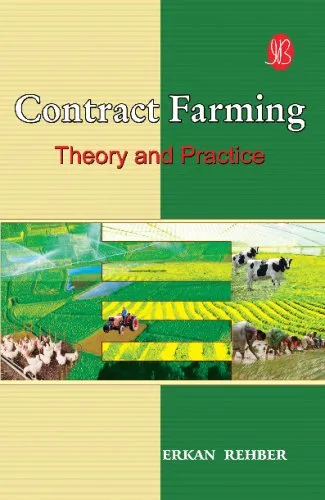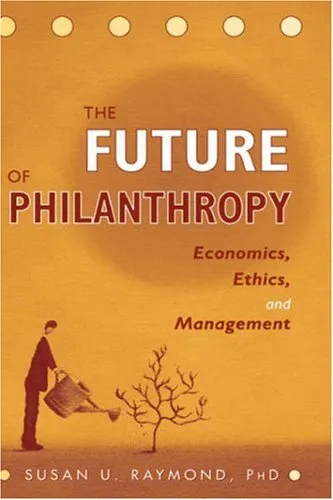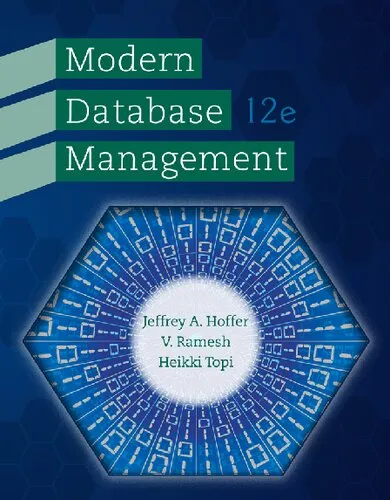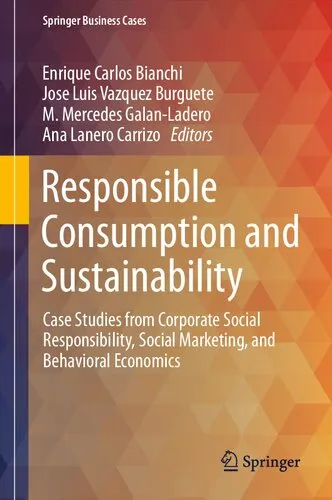Contract Farming: Theory and Practice
4.0
بر اساس نظر کاربران

شما میتونید سوالاتتون در باره کتاب رو از هوش مصنوعیش بعد از ورود بپرسید
هر دانلود یا پرسش از هوش مصنوعی 2 امتیاز لازم دارد، برای بدست آوردن امتیاز رایگان، به صفحه ی راهنمای امتیازات سر بزنید و یک سری کار ارزشمند انجام بدینکتاب های مرتبط:
معرفی کتاب «Contract Farming: Theory and Practice»
کتاب «Contract Farming: Theory and Practice» نوشتهٔ ارکان رهبر یکی از منابع برجسته در حوزه کشاورزی قراردادی است که به بررسی نظریهها، اصول، و کاربردهای این مدل میپردازد. این کتاب به شکلی جامع، استفاده از سیستم Contract Farming را برای تحول در کشاورزی، بهبود زنجیره تأمین و پایداری اقتصادی تبیین میکند. در این بخش، به طور دقیق به بررسی این کتاب ارزشمند میپردازیم.
خلاصهای از کتاب
این کتاب در سه بخش کلی تقسیمبندی شده است که به بازکردن مفهوم Contract Farming میپردازد. بخش اول به مرور نظریههای مرتبط با کشاورزی قراردادی پرداخته و تعاریف و مفاهیم پایهای را ارائه میدهد. نویسنده در این بخش به تفصیل درباره اصول حقوقی، مالی و اجتماعی این سیستم توضیح میدهد.
بخش دوم کتاب به مطالعه موردی کشورهای مختلف اختصاص دارد. ارکان رهبر در این بخش نشان میدهد که چگونه Contract Farming در کشورهای توسعهیافته و در حال توسعه به کار گرفته شده و چطور این سیستم توانسته به کاهش فقر، افزایش بهرهوری و گسترش اقتصاد محلی کمک کند. این بخش پر از مثالهای کاربردی و دادههای آماری است که مطالعه آن را برای محققان و دستاندرکاران جذاب میسازد.
بخش سوم، نگاه آیندهنگرانه و انتقادی به موضوع دارد. مسئله ریسکها، نابرابریها و سوءاستفادههایی که ممکن است در این سیستم رخ دهد، همراه با ارائه راهکارهایی برای بهبود آن، در این بخش مورد بررسی قرار گرفته است. این رویکرد جامع نشاندهندهٔ توانمندی نویسنده در تحلیل مسائل چندبعدی است.
نکات کلیدی کتاب
بر اساس بررسیهای گسترده در این کتاب، نکات زیر مهمترین دستاوردها و مفاهیم ارائهشده در آن هستند:
- تعریف دقیق و عملیاتی Contract Farming همراه با تحلیل مفاهیم حقوقی و اقتصادی مرتبط.
- شناسایی نقش این سیستم در مدیریت ریسکهای کشاورزی، از جمله ریسک بازار و آب و هوا.
- بررسی اثرات اجتماعی و اقتصادی این مدل بر معیشت کشاورزان خرد و جوامع روستایی.
- ارائه مطالعات موردی واقعی از مناطق و کشورهایی که Contract Farming در آنها به موفقیت دست یافته است.
- تحلیل روابط بین کشاورزان و سرمایهگذاران و ارائه راهنمایی برای ساختاردهی قراردادهای بهتر.
نقلقولهای معروف از کتاب
کتاب «Contract Farming: Theory and Practice» حاوی ایدهها و جملههای برجستهای است که برای درک بهتر نقش کشاورزی قراردادی ارزشمند هستند:
"Contract farming is not merely a contract; it is a partnership that connects the farm to the market under a structured and mutually beneficial agreement."
"While contract farming provides new opportunities, its success relies on the integrity of agreements and mutual trust between stakeholders."
"In the agro-economic landscape, contract farming serves as a bridge between traditional practices and modern global value chains."
چرا این کتاب مهم است؟
اهمیت این کتاب ناشی از توانایی آن در ترکیب نظریه با تجربه است. این منبع نه تنها برای دانشجویان و پژوهشگران کشاورزی و اقتصاد مفید است، بلکه کسانی که در سیاستگذاریهای کشاورزی و توسعه پایدار اشتغال دارند نیز میتوانند از آن بهره بگیرند.
پیشرفت در کشاورزی نیازمند درک عمیق از سیستمهای متداول و نوین مانند Contract Farming است و این کتاب با پوشش جامع تمام جنبهها، از نظریه و کاربرد گرفته تا تحلیل و آیندهنگری، به عنوان مرجعی بیرقیب تلقی میشود. ارکان رهبر به درستی نشان میدهد که چگونه توسعه این سیستم میتواند به بهبود وضعیت معیشتی کشاورزان، کاهش نابرابری و توسعه پایدار در کشورهای مختلف منجر شود.
Introduction to "Contract Farming: Theory and Practice"
"Contract Farming: Theory and Practice" delves deep into one of the most impactful and complex arrangements in agricultural economics—contract farming. Spanning a comprehensive analysis of its theoretical underpinnings as well as its practical applications, this book is an essential resource for academics, practitioners, policymakers, and anyone with an interest in agricultural development and rural economics. The work encapsulates the dynamics, challenges, and opportunities inherent in contract farming systems, aiming to bridge the gap between economic theory and everyday farming practices.
Written with clarity and depth, the book provides a multi-dimensional view of contract farming by exploring its implications for both small-scale farmers and agribusiness firms. It critically examines the economic, social, and political factors that influence contract farming environments while offering practical insights into how these models can contribute to improving agricultural productivity and rural livelihoods. As the global landscape increasingly shifts toward integrated supply chains, this book provides a timely analysis of a pivotal aspect of agricultural economies around the world.
Detailed Summary of the Book
The book is structured to explore contract farming from its conceptual foundations to real-world case studies. Theoretical frameworks are meticulously explained, giving readers insights into the economic rationale behind contract farming. These models are then contextualized with real-world scenarios, helping readers understand how theory translates into practice.
The opening chapters deal with the history and evolution of contract farming, while later sections dive into its typology, design, and implementation. Special attention is given to the roles of key stakeholders—farmers, agribusiness firms, financiers, and government institutions. Each chapter includes critical analyses of the benefits and risks associated with contract farming systems, shedding light on how smallholder farmers can balance their power with large corporations to ensure equitable benefits.
Furthermore, the book touches on crucial topics like price volatility, market access, technology transfer, and the socio-political dynamics that either facilitate or hinder the success of contractual arrangements. The inclusion of global case studies ensures that the reader appreciates the diversity and adaptability of contract farming systems across different countries and crop types.
Key Takeaways
- Deep insights into how contract farming works, including its benefits and challenges.
- Comprehensive analysis of the economic and social impacts of contractual agriculture systems.
- Different models and types of contract farming arrangements, each with unique characteristics and stakeholder dynamics.
- Recommendations for policymakers and practitioners to improve the efficiency and fairness of contract farming systems.
- Practical guidelines for balancing power asymmetry between agribusiness firms and smallholder farmers.
Famous Quotes from the Book
"Contract farming is not just a transaction; it is a relationship where trust and mutual benefits are as important as profitability."
"The challenge is not merely connecting farmers to markets but ensuring equity and sustainability within these connections."
"While contract farming holds immense potential to transform agriculture, its success depends on a delicate balance of power, trust, and accountability."
Why This Book Matters
The significance of "Contract Farming: Theory and Practice" lies in its ability to provide actionable insights into one of the most critical developments in global agriculture. In an era where supply chains have become increasingly complex and integrated, understanding the mechanisms of contract farming is indispensable for fostering inclusive agricultural growth.
The book equips smallholder farmers, agribusiness managers, and policymakers with the tools and knowledge to create and sustain equitable partnerships. As the global population grows and food security concerns intensify, the need for efficient and resilient agricultural systems becomes paramount. Contract farming, when managed correctly, can serve as a crucial mechanism to address these challenges.
By offering both theoretical and practical perspectives, this book provides a balanced approach that appeals to a wide audience. Whether you are a student of agricultural economics or a practitioner engaged in rural development, "Contract Farming: Theory and Practice" provides a one-stop guide to understanding this critical component of modern agriculture.
دانلود رایگان مستقیم
شما میتونید سوالاتتون در باره کتاب رو از هوش مصنوعیش بعد از ورود بپرسید
دسترسی به کتابها از طریق پلتفرمهای قانونی و کتابخانههای عمومی نه تنها از حقوق نویسندگان و ناشران حمایت میکند، بلکه به پایداری فرهنگ کتابخوانی نیز کمک میرساند. پیش از دانلود، لحظهای به بررسی این گزینهها فکر کنید.
این کتاب رو در پلتفرم های دیگه ببینید
WorldCat به شما کمک میکنه تا کتاب ها رو در کتابخانه های سراسر دنیا پیدا کنید
امتیازها، نظرات تخصصی و صحبت ها درباره کتاب را در Goodreads ببینید
کتابهای کمیاب یا دست دوم را در AbeBooks پیدا کنید و بخرید
1274
بازدید4.0
امتیاز0
نظر98%
رضایتنظرات:
4.0
بر اساس 0 نظر کاربران
Questions & Answers
Ask questions about this book or help others by answering
No questions yet. Be the first to ask!













